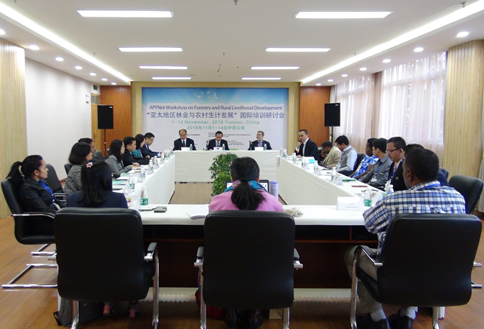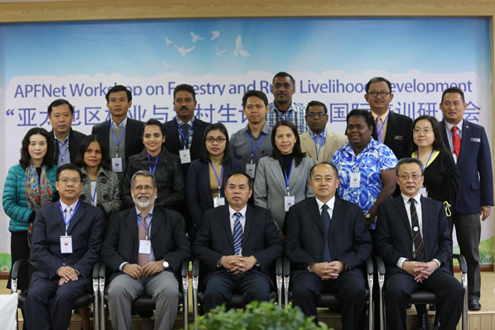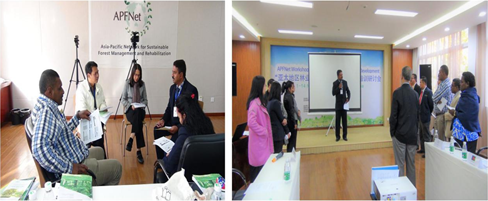On the occasion of the 10th Anniversary of APFNet and in line with its Five-Year Strategic Plan of APFNet Training Programme, the Workshop on Forestry and Rural Livelihood Development has been commenced in the Center for International Exchange and Cooperation at Southwest Forestry University (SWFU) on 1st November. The workshop aims to assess the linkage between forest management and rural livelihood improvement and explore the ways in which the livelihoods of rural communities might be improved through better forest management; provide an overview of the experiences and best forestry practices aimed at enhancing rural livelihood development; and analyze and assess implications of key policy, institutional and technological developments and the potentials and limitations for livelihood improvement through biodiversity conservation and climate change mitigation and adaptation measures.
On the opening ceremony of 2nd November, invited guests included Prof. Guo Junhui (Chancellor of SWFU), Dr. C.T.S. Nair (APFNet senior consultant/workshop facilitator/core resource person). Xu Zhijiang (Director of International Cooperation Office, the Forestry Department of Yunnan Province), Prof. Yang Song (Director of International Cooperation Office of SWFU) and Prof. Shen Lixin (Director of APFNet-KTC). Besides, a total of 14 participants from 12 economies in the Asia-Pacific Region attend this event, these economies including Bangladesh, Cambodia, China, Fiji, Indonesia, Malaysia, Myanmar, Nepal, Philippines, Sri Lanka, Thailand and Vietnam.

A photo taken in the opening ceremony of the Workshop
The opening ceremony of the Workshop was chaired by Prof. Shen Lixin, and then he introduced the invited participants and the meeting agenda. Next, Prof. Guo Junhui on behalf of Southwest Forestry University (SWFU) expressed his warmest welcome to all workshop participants and gratitude to the supports from the Department of Foreign Affairs and the Forestry Department of Yunnan Province. He also highlighted that it’s important to integrate forest management and biodiversity conservation with human livelihood improvement in the Asia-Pacific Region. The current workshop as the 21th APFNet thematic workshop provides a significant platform for promoting forest management and forestry development in a socal dimension, and also helps deepen friendship and collaboration among the regional economies.
Followed by Mr. Xu Zhijiang, on behalf of the Forestry Department of Yunnan Province, he firstly extended a hearty welcome to the workshop organizer, resource persons and the representatives from the regional economies. Then he gave some background information about forestry profile of Yunnan Province and pointed out a closer collaboration with the GMS economies by means of pilot projects in recent years. He said the field trip in Pu’er City will provide a good learning opportunity for participants and grab the-first-hand information of how the livelihood of local communities can be improved through a sustainable forest management, and the communities have a strong willingness to conserve forests. At last, he wish the workshop make a great success.
Dr. C.T.S. Nair as APFNet senior consultant illustrated that a number of issues are associated with forestry and rural livelihood development in the 21th Century, and none of these issues/challenges cannot be solved at the local level. There is a need in background and experience sharing among the Asia-Pacific economies. Therefore, the current workshop is unique to provide a learning opportunity to the young officials from the regional economies, and a networking could be well-established after this event.
News Release
APFNet Workshop on Forestry and Rural Livelihood Development was successfully concluded on 13th November, 2018
On the occasion of the 10th Anniversary of APFNet and in line with its Five-Year Strategic Plan of APFNet Training Programme, the Workshop on Forestry and Rural Livelihood Development was successfully concluded in the Center for International Exchange and Cooperation at Southwest Forestry University (SWFU) on 13th November. The objectives of the Workshop aimed at:
- Assessing the linkage between forest management and rural livelihood improvement and explore the ways in which the livelihoods of rural communities might be improved through better forest management;
- Providing an overview of the experiences and best forestry practices aimed at enhancing rural livelihood development; and
- Analyzing and assessing implications of key policy, institutional and technological developments and the potentials and limitations for livelihood improvement through biodiversity conservation and climate change mitigation and adaptation measures.
The workshop was structured by four interlinked components, these including keynote lectures, presentations by participants, group work and discussion and field trip. Each component provides a good learning opportunity to share knowledge and experience among resource persons and participants.
A total of 10 keynote lectures were given by five resource persons, which provided a holistic picture of forestry contribution to rural livelihoods. In supplement with lectures, two panel discussions focused on SWOT analysis on poverty reduction through forestry and Indigenous knowledge and livelihood of forest dependent people. Besides, 14 presentations by participants provided a number of case studies based on different specific-economy contexts, which help understand how the actual performance of forestry-based livelihood improvement on the ground. Moreover, group work on preparation of policy brief is designed as one of key components of the Workshop, which emphasis on strengthening technical skills of forestry officials.
On 9 to 12 November, the field trip was conducted in Pu’er City of Yunnan Province. Workshop participants visited numerous field sites, which help grab the-first-hand information of how the principle of sustainable forest management can be accommodated to alleviate poverty of local communities and increase their family income and incentives of forest conservation. Also, with technical supports from government and research institute and private enterprises, there is a great contribution to the value adding of forest products.
The closing ceremony was commenced at SWFU on 13th November, 2018. Prof. Shen Lixin on behalf of workshop organizer and Prof. Yang Song as SWFU representative attended the ceremony and issued workshop certificates to participants.

The workshop was highly appreciated by workshop participants and successfully concluded. There are some key findings of the workshop summarized as followed:
- The nature of dependence on forests changes in line with the larger societal changes. The level of livelihood dependence of pre-agrarian societies on forests is very high. Livelihood needs of an agrarian society are different from those that of industrial and post-industrial societies.
- The differing nature of livelihood needs results in conflicts. Managing such conflicts remains a major challenge for forestry in most economies in the Asia-Pacific region.
- Increasingly environmental services, especially clean air, water and climate change mitigation are becoming more important than the material livelihood needs.
- For most developing economies the provision of material livelihoods will remain important, especially in situations where there are large number of forest-dependent people who are poor.
- For many of the forest dependent people the access to other assets is extremely limited and this makes them highly dependent on forests.
- A wide array of strategies and approaches are being pursued to enhance the contribution of forests to rural livelihoods. These are highly context specific and a “one-size-fits all” approach is bound to fail.
- Governance improvement remains the most important issue in improving the livelihood contribution of forests. Good governance embodies six basic principles: Participation, Accountability, Transparency, Effectiveness, Efficiency and Fairness.
- Though most economies have revised their forest policies and legislation emphasizing on livelihood improvement, a number of challenges exist in translating these policies into action:
- Meeting the livelihood needs are dependent on a host of other policies and contradictions between different policies often undermines what is visualized in forest policies.
- Conflicting objectives and absence of clarity on establishing trade-offs between them within the forest policies.
- A major challenge in this regard is that most of the rural livelihood needs, are under the informal domain, outside the formal system of policies, legislation and institutions. This has made interventions in the formal domain ineffective and often counter-productive.
- Tenure reform is a key to improving livelihoods of forest dependent communities, but cannot work alone to improve local livelihood.
- Enhancing productivity and introducing advanced technology thus economic viability and equitable distribution of benefits are critical to enhance the livelihood roles of forests.
- Indigenous communities are integral to the rich cultural and ecological diversity among the Asia-Pacific economies, but it remains numerous challenges in a sustainable forest management.
- Merely producing products will not help. Value addition through processing is a key to improve livelihoods. This will require a better understanding of the value chains.
- In a globalized world the value chains are undergoing rapid and often unpredictable changes. It becomes crucial to understand and adapt those changes to meet the livelihood needs.
- Social cost-benefit analysis is very useful tool which helps make a decision in the programs/projects of poverty alleviation; However not effective in a reality due to widely misuse and a lack of reliable information.
